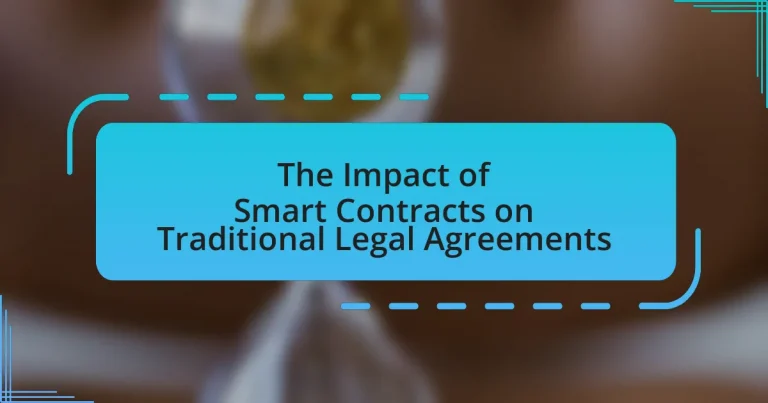Smart contracts are self-executing agreements with terms encoded on blockchain technology, contrasting with traditional legal agreements that require human oversight and enforcement. This article explores the functionality of smart contracts, their advantages over conventional contracts, and the implications of their automation, including increased efficiency and reduced costs. It also addresses the challenges smart contracts pose to existing legal frameworks, such as issues of enforceability and jurisdiction, while highlighting current regulatory developments and best practices for implementation. Additionally, the article examines real-world applications of smart contracts in industries like finance and real estate, providing insights into their integration into legal systems and the perspectives of legal professionals on this emerging technology.
What are Smart Contracts and How Do They Relate to Traditional Legal Agreements?
Smart contracts are self-executing contracts with the terms of the agreement directly written into code, operating on blockchain technology. They automate and enforce contractual obligations without the need for intermediaries, contrasting with traditional legal agreements that typically require human oversight and legal enforcement mechanisms. Traditional contracts rely on legal frameworks and courts for dispute resolution, while smart contracts execute automatically when predefined conditions are met, reducing the potential for disputes and increasing efficiency. This distinction highlights how smart contracts can streamline processes and lower costs compared to conventional agreements, as evidenced by their increasing adoption in sectors like finance and supply chain management.
How do smart contracts function in the digital landscape?
Smart contracts function as self-executing agreements with the terms of the contract directly written into code on a blockchain. This technology enables automatic execution of contract terms when predetermined conditions are met, eliminating the need for intermediaries. For instance, Ethereum, a leading blockchain platform, allows developers to create smart contracts that facilitate transactions and enforce agreements without human intervention, thereby increasing efficiency and reducing costs. The decentralized nature of blockchain ensures transparency and security, as all transactions are recorded on a public ledger, making it difficult to alter or tamper with the contract once deployed.
What technologies underpin smart contracts?
Smart contracts are primarily underpinned by blockchain technology, which provides a decentralized and immutable ledger for recording transactions. This technology ensures that once a smart contract is deployed on the blockchain, it cannot be altered, thus guaranteeing the integrity of the contract. Additionally, programming languages such as Solidity, used on platforms like Ethereum, enable the creation of smart contracts by allowing developers to write code that defines the contract’s terms and conditions. The combination of blockchain’s security features and the programmability of these languages facilitates automated execution and enforcement of contract terms without the need for intermediaries.
How do smart contracts ensure compliance and execution?
Smart contracts ensure compliance and execution by automating the enforcement of contractual terms through self-executing code on a blockchain. This technology eliminates the need for intermediaries, as the contract’s conditions are programmed to trigger specific actions once predetermined criteria are met. For instance, if a payment is made, the smart contract automatically transfers ownership of an asset, ensuring that both parties adhere to the agreed terms without manual intervention. The transparency and immutability of blockchain technology further enhance compliance, as all transactions are recorded and cannot be altered, providing a verifiable audit trail that reinforces trust and accountability in the execution of agreements.
What are the key differences between smart contracts and traditional legal agreements?
Smart contracts are self-executing contracts with the terms of the agreement directly written into code, while traditional legal agreements are manually drafted documents that require human interpretation and enforcement. The key differences include automation, where smart contracts automatically execute actions when conditions are met, contrasting with traditional agreements that rely on external enforcement mechanisms. Additionally, smart contracts operate on blockchain technology, providing transparency and immutability, whereas traditional agreements can be altered and are subject to human error and interpretation. Furthermore, smart contracts reduce the need for intermediaries, streamlining processes and potentially lowering costs, while traditional agreements often involve lawyers and other intermediaries, increasing complexity and expenses.
How do the enforcement mechanisms differ?
Enforcement mechanisms differ significantly between smart contracts and traditional legal agreements. Smart contracts utilize automated execution through blockchain technology, ensuring that terms are enforced without the need for intermediaries, while traditional legal agreements rely on judicial systems for enforcement, which can be time-consuming and subject to interpretation. For instance, in smart contracts, once conditions are met, the contract self-executes, whereas traditional contracts require parties to seek legal recourse to enforce terms, often leading to disputes and delays. This fundamental difference highlights the efficiency and reliability of smart contracts in executing agreements compared to the more cumbersome processes associated with traditional legal frameworks.
What are the implications of automation in smart contracts?
Automation in smart contracts significantly enhances efficiency and reduces the need for intermediaries in legal agreements. By executing predefined conditions automatically, smart contracts minimize human error and expedite transaction processes. For instance, a study by the World Economic Forum indicates that smart contracts can reduce transaction costs by up to 30% by eliminating the need for traditional legal oversight. This shift not only streamlines operations but also increases transparency, as all parties can access the same immutable data on the blockchain. Consequently, the implications of automation in smart contracts include increased operational efficiency, cost reduction, and enhanced trust among parties involved in legal agreements.
What potential advantages do smart contracts offer over traditional legal agreements?
Smart contracts offer several advantages over traditional legal agreements, including automation, efficiency, and enhanced security. Automation allows smart contracts to execute transactions automatically when predefined conditions are met, reducing the need for intermediaries and minimizing delays. Efficiency is achieved through faster processing times, as transactions can be completed in real-time without the bureaucratic hurdles often associated with traditional contracts. Enhanced security is provided by blockchain technology, which ensures that once a smart contract is deployed, it cannot be altered or tampered with, thereby reducing the risk of fraud. These advantages contribute to a more streamlined and reliable contractual process.
How do smart contracts enhance efficiency and reduce costs?
Smart contracts enhance efficiency and reduce costs by automating and streamlining processes that traditionally require intermediaries. By executing predefined conditions automatically, smart contracts eliminate the need for manual intervention, which reduces the time and resources spent on contract management. For instance, a study by the World Economic Forum estimates that smart contracts could reduce transaction costs by up to 30% in certain industries by minimizing administrative overhead and errors associated with human involvement. This automation not only accelerates the execution of agreements but also enhances transparency and trust among parties, further driving down costs associated with disputes and enforcement.
What role do smart contracts play in increasing transparency?
Smart contracts enhance transparency by automating and recording transactions on a blockchain, which is an immutable ledger. This technology ensures that all parties involved can access the same information in real-time, reducing the risk of fraud and miscommunication. For instance, once a smart contract is deployed, its terms are visible and cannot be altered without consensus, providing a clear audit trail. According to a report by the World Economic Forum, the use of blockchain and smart contracts can increase trust among parties by ensuring that all actions are verifiable and publicly accessible, thereby fostering a more transparent environment in legal agreements.
What Challenges Do Smart Contracts Present to Traditional Legal Frameworks?
Smart contracts challenge traditional legal frameworks primarily due to their automated execution and lack of human oversight. Traditional legal systems rely on human interpretation and enforcement of contracts, while smart contracts operate on predetermined code that executes automatically when conditions are met. This automation can lead to issues such as the inability to address unforeseen circumstances or disputes, as smart contracts do not accommodate the nuances of human judgment or legal interpretation. Additionally, the decentralized nature of blockchain technology complicates jurisdictional authority, making it difficult for traditional legal systems to enforce contracts that exist outside their regulatory reach. These challenges highlight the need for legal adaptation to effectively integrate smart contracts within existing legal structures.
What legal uncertainties surround the use of smart contracts?
Legal uncertainties surrounding the use of smart contracts include issues of enforceability, jurisdiction, and compliance with existing laws. Enforceability is questioned because smart contracts may not meet traditional legal standards for contracts, such as mutual consent and consideration. Jurisdictional challenges arise since smart contracts operate on decentralized networks, complicating the identification of applicable legal frameworks. Additionally, compliance with regulations, such as data protection laws and financial regulations, remains uncertain, as the automated nature of smart contracts may conflict with legal requirements that necessitate human oversight. These uncertainties highlight the need for clearer legal definitions and frameworks to govern smart contracts effectively.
How do jurisdictions handle smart contracts differently?
Jurisdictions handle smart contracts differently primarily based on their legal frameworks and regulatory approaches. For instance, some jurisdictions, like the United States, have adopted a more cautious approach, emphasizing the need for existing contract laws to apply to smart contracts, while others, such as Switzerland, have created specific legal frameworks that recognize and regulate smart contracts explicitly. This variance is evident in how countries interpret the enforceability of smart contracts; in the U.S., courts may require additional evidence of intent and agreement, whereas in jurisdictions with clear regulations, smart contracts may be treated similarly to traditional contracts. The differences in handling smart contracts reflect broader legal principles and the willingness of jurisdictions to adapt to technological advancements.
What are the risks of relying on code for legal agreements?
Relying on code for legal agreements poses significant risks, including the potential for coding errors, lack of legal clarity, and challenges in enforcement. Coding errors can lead to unintended consequences, as even minor mistakes in the code can result in incorrect execution of the agreement. Additionally, legal language often requires nuanced interpretation that code may not capture, leading to ambiguity and disputes over intent. Furthermore, enforcing code-based agreements can be problematic, as traditional legal systems may not recognize or adequately address the complexities of smart contracts, creating difficulties in resolving conflicts. These risks highlight the need for careful consideration and oversight when integrating code into legal frameworks.
How do traditional legal professionals view the rise of smart contracts?
Traditional legal professionals generally view the rise of smart contracts with a mix of skepticism and cautious interest. Many legal experts express concerns about the enforceability and legal recognition of smart contracts, as they often lack the nuanced understanding of human intent that traditional contracts provide. Additionally, issues related to jurisdiction, liability, and the potential for coding errors raise significant apprehensions among these professionals. A survey conducted by the International Association for Contract and Commercial Management in 2020 indicated that 60% of legal professionals believe that smart contracts could disrupt traditional legal practices, but 70% also emphasized the need for regulatory frameworks to address these challenges.
What concerns do lawyers have regarding smart contracts?
Lawyers have several concerns regarding smart contracts, primarily focusing on issues of enforceability, legal interpretation, and liability. Enforceability is a significant concern because smart contracts operate on blockchain technology, which may not align with existing legal frameworks that govern traditional contracts. Additionally, the lack of clear legal definitions and standards for smart contracts raises questions about how they can be interpreted in a court of law. Liability is another critical issue, as determining responsibility for errors or breaches in a smart contract can be complex, especially when multiple parties and automated processes are involved. These concerns highlight the need for legal clarity and regulatory frameworks to address the unique challenges posed by smart contracts in the context of traditional legal agreements.
How can legal professionals adapt to the emergence of smart contracts?
Legal professionals can adapt to the emergence of smart contracts by enhancing their understanding of blockchain technology and its implications for contract law. This adaptation involves acquiring knowledge about how smart contracts function, including their coding and execution processes, which differ significantly from traditional legal agreements. Legal professionals should also engage in continuous education and training programs focused on technology in law, as well as collaborate with technologists to develop and implement smart contract solutions that comply with existing legal frameworks. Furthermore, they can advocate for regulatory clarity regarding smart contracts to ensure that legal standards are met while leveraging the efficiency and automation benefits that smart contracts offer.
How Are Smart Contracts Being Integrated into Existing Legal Systems?
Smart contracts are being integrated into existing legal systems through the adoption of blockchain technology and regulatory frameworks that recognize their validity. Various jurisdictions are beginning to amend laws to accommodate smart contracts, such as the Uniform Electronic Transactions Act in the United States, which acknowledges electronic signatures and records, thereby facilitating the use of smart contracts in legal agreements. Additionally, countries like Switzerland and Estonia have established legal frameworks that explicitly recognize smart contracts, promoting their use in commercial transactions. This integration is further supported by pilot projects and collaborations between legal institutions and technology companies, demonstrating practical applications of smart contracts in areas like real estate, supply chain management, and financial services.
What examples exist of smart contracts in practice today?
Examples of smart contracts in practice today include Ethereum-based decentralized applications (dApps) like Uniswap for automated trading and Chainlink for decentralized oracles. These platforms utilize smart contracts to facilitate transactions without intermediaries, ensuring transparency and security. For instance, Uniswap allows users to swap cryptocurrencies directly through smart contracts, which automatically execute trades based on predefined conditions. Chainlink enhances smart contracts by providing real-world data to blockchain applications, enabling them to respond to external events. These implementations demonstrate the practical utility of smart contracts in various sectors, including finance and data management.
How are industries like finance and real estate utilizing smart contracts?
Industries like finance and real estate are utilizing smart contracts to automate and streamline transactions, reducing the need for intermediaries. In finance, smart contracts facilitate secure and transparent transactions, such as automated loan agreements and trade settlements, which enhance efficiency and reduce costs. In real estate, smart contracts enable automated property transfers and escrow services, ensuring that conditions are met before funds are released, thereby minimizing fraud and increasing trust in transactions. These applications demonstrate how smart contracts can transform traditional processes by providing greater security, efficiency, and transparency.
What lessons can be learned from early adopters of smart contracts?
Early adopters of smart contracts demonstrate the importance of clarity and precision in contract terms. These users have shown that well-defined conditions within smart contracts can significantly reduce disputes and enhance trust among parties. For instance, a study by the World Economic Forum in 2018 highlighted that smart contracts can automate and enforce agreements without the need for intermediaries, leading to faster transactions and lower costs. Additionally, early adopters emphasize the necessity of thorough testing and security audits to prevent vulnerabilities, as evidenced by incidents like the DAO hack in 2016, which resulted from poorly coded smart contracts. These lessons underline the critical need for careful design and implementation in the adoption of smart contracts.
What regulatory frameworks are being developed for smart contracts?
Regulatory frameworks for smart contracts are being developed to address legal recognition, enforceability, and compliance with existing laws. Various jurisdictions, including the European Union and the United States, are exploring legislation that clarifies the legal status of smart contracts, ensuring they align with traditional contract law principles. For instance, the European Commission has proposed regulations that aim to create a comprehensive legal framework for blockchain technologies, which includes smart contracts, emphasizing transparency and consumer protection. Additionally, states like Wyoming have enacted laws that explicitly recognize smart contracts as legally binding, providing a model for other regions to follow. These developments indicate a growing recognition of the need for regulatory clarity in the evolving landscape of digital agreements.
How are governments responding to the challenges posed by smart contracts?
Governments are responding to the challenges posed by smart contracts by developing regulatory frameworks that address their legal status and enforceability. For instance, countries like Switzerland and Estonia have implemented specific laws that recognize smart contracts as legally binding, thereby providing clarity and security for users. Additionally, the European Union is exploring comprehensive regulations to ensure consumer protection and mitigate risks associated with smart contracts, as highlighted in the EU’s Digital Finance Strategy. These proactive measures aim to balance innovation with legal certainty, ensuring that smart contracts can be integrated into existing legal systems effectively.
What best practices are emerging for the legal use of smart contracts?
Best practices emerging for the legal use of smart contracts include ensuring clarity in contract terms, incorporating legal review, and maintaining compliance with existing regulations. Clarity in contract terms is crucial as it minimizes ambiguity and enhances enforceability; for instance, clearly defined conditions and obligations can prevent disputes. Legal review by qualified professionals ensures that smart contracts align with applicable laws and regulations, which is essential given the evolving legal landscape surrounding blockchain technology. Additionally, compliance with regulations, such as data protection laws and financial regulations, is necessary to mitigate legal risks and ensure that smart contracts are valid and enforceable in a court of law. These practices are supported by ongoing discussions in legal forums and publications that emphasize the importance of integrating traditional legal principles with innovative technology.
What practical steps can businesses take to implement smart contracts effectively?
Businesses can implement smart contracts effectively by following a structured approach that includes identifying suitable use cases, selecting the right blockchain platform, and ensuring legal compliance. First, businesses should assess their operations to identify processes that can benefit from automation and transparency, such as supply chain management or payment processing. Next, selecting a blockchain platform that aligns with their needs, such as Ethereum for its robust smart contract capabilities, is crucial. Additionally, businesses must ensure that their smart contracts comply with existing legal frameworks to avoid potential disputes, which can be achieved by consulting legal experts familiar with blockchain technology. This structured approach enhances efficiency and reduces risks associated with smart contract implementation.
How can organizations assess their readiness for smart contracts?
Organizations can assess their readiness for smart contracts by evaluating their existing technological infrastructure, legal frameworks, and employee expertise. A thorough analysis of current systems ensures compatibility with blockchain technology, while reviewing legal compliance helps identify necessary adjustments to existing contracts. Additionally, assessing employee knowledge and skills related to smart contracts is crucial, as it determines the organization’s ability to implement and manage these technologies effectively. Research indicates that organizations with a clear understanding of blockchain and smart contracts are more likely to successfully integrate them into their operations, enhancing efficiency and reducing legal disputes.
What common pitfalls should businesses avoid when adopting smart contracts?
Businesses should avoid the common pitfalls of inadequate understanding of smart contracts, lack of legal compliance, and insufficient security measures when adopting them. Inadequate understanding can lead to misconfigured contracts that do not fulfill business needs, as many organizations underestimate the complexity of coding and the implications of automated execution. Lack of legal compliance can result in contracts that are not enforceable in a court of law, as jurisdictions may have varying regulations regarding smart contracts. Insufficient security measures can expose businesses to vulnerabilities, as smart contracts are susceptible to hacking and exploits if not properly audited. These pitfalls can undermine the effectiveness and reliability of smart contracts, ultimately affecting business operations and legal standing.




